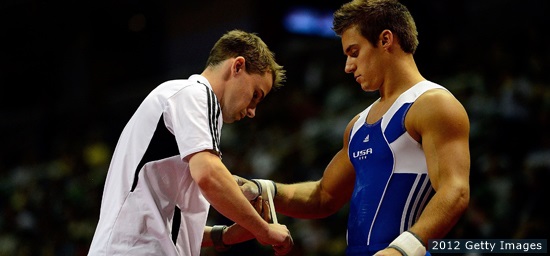
Article reposted from Healio
Author: Thomas W. Kaminski, PhD, ATC, FACSM, FNATA
As I write this editorial, the 2016 Olympic Games in Rio de Janeiro, Brazil, have begun. The network broadcast includes live coverage of a plethora of events and many feature stories on the Olympians taking part in the Games. I cannot help but think about the many individuals working “behind the scenes” who make this world event of true sportsmanship happen every 4 years. Just take a few minutes to contemplate the event planning and logistics required for the event venues to run smoothly and for these tremendous athletes to strut their stuff.
As an athletic trainer myself, I’m used to being “behind the scenes” preparing athletes for competition and working to prevent, treat, and rehabilitate injuries that may hinder peak performance. So as the 2016 Olympic Games play out, I wish to devote this editorial to the unsung heroes of Rio and those sports medicine professionals who keep these Olympians at the top of their games. This group includes a cadre of physicians, certified athletic trainers, physical therapists, nutritionists, exercise specialists, massage therapists, and many more. As perhaps the most developed country in the world, the United States benefits the most from the services provided by these dedicated professionals. I’m sure there are many countries represented in the Olympic Games who could only hope for such care and expertise.
I would like to focus my commentary on the athletic trainers and their role in the Olympic Games. I’ve been fortunate to have gained personal insight into the process from a former classmate from my days as a graduate student at the University of Arizona, Mr. Ed Ryan, who served as Director for the United States Olympic Committee (USOC) Sports Medicine Committee for many years in the 1980s and 1990s. I’ve even had a chance to visit several of the Olympic Training Centers in the United States for a firsthand look at the top-rated sports medicine services our Olympic athletes receive. As an American I would expect nothing less! Although the U.S. Olympic movement employs several full-time athletic training professionals, including the Director, they rely heavily on a corps of volunteer professionals to assist with health care delivery throughout the year, and especially during years when the Olympic Games are held. For example, this year in Rio there are 554 American athletes competing for Team USA across the 42 different sports.
I was curious as to how one might be chosen for the role as athletic trainer, so I did a bit of research to find out just what the process is. Early in my career as an athletic trainer, I was familiar with the application process and had at one time submitted an application for consideration as a volunteer. Needless to say, I was never chosen!
The process has changed a bit in the 30+ years since I became certified as an athletic trainer. The USOC Sports Medicine Division is responsible for oversight of the volunteer medical providers who deliver sports health care to the elite athletes of Team USA. Operating three sports medicine clinics in the United States (Colorado Springs, CO, Chula Vista, CA, and Lake Placid, NY) the Sports Medicine Division relies on the volunteer sports health care professionals with a minimum of 3 years of experience to apply. If chosen, these professionals then work side by side with the full-time USOC staff members in a collaborative environment to provide a continuum of care that is unparalleled in the world of sports medicine. I encourage our readership (and others) to learn more about this exceptional opportunity by visiting the USOC’s web site at http://www.teamusa.org/About-the-USOC/Athlete-Development/Sports-Medicine. Here you will find the formal application and additional details on the program. Volunteer medical providers who are exceptional and proven successful may be given other opportunities/rotations/assignments within Team USA’s many sport agencies, and a chance to serve the United States at international competitions, including the Olympic Games.
By the time you read this editorial, the 2016 Olympic Games will have ended, but the glory for those who achieved success will be alive and well. However, we should pause to acknowledge those who worked quietly and without fanfare to keep these elite athletes on the court and fields of play, in the race and in the pool, to perform at their highest, all in the name of the Olympic ideals of excellence, friendship, and respect. So as the chants for “GO USA, GO USA, GO USA” subside, don’t forget those medical professionals who worked tirelessly behind the curtain to aid in Team USA’s quest for the GOLD!